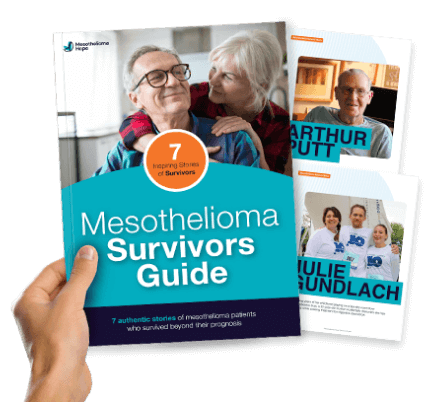How Is Mesothelioma Treated?
Mesothelioma cancer is best treated with a combination of therapies used to manage symptoms and improve well-being. This approach is known as multimodal therapy, and it’s a cornerstone of effective mesothelioma treatment.
Common mesothelioma treatment options include:
- Surgery: Visible tumors are removed from the body.
- Chemotherapy: Drugs are injected into the bloodstream or applied directly to the chest or abdominal area during surgery to kill cancer cells.
- Radiation: High-energy X-rays or particles are directed at tumors to kill cancer cells or shrink tumors.
- Immunotherapy: Medications are given via an infusion to help the immune system identify and destroy cancer cells.
- Clinical trials: Patients can join clinical trials investigating new treatment approaches, experimental drugs, or innovative therapies for mesothelioma.
Your treatment plan depends on where your mesothelioma is located, its stage (spread and severity), and cell type. A mesothelioma doctor will consider your age, overall health, and ability to tolerate possible side effects when evaluating available treatments.


Find a doctor in your area
Our registered nurse can help you schedule appointments with top mesothelioma specialists.
Life Expectancy With Mesothelioma Treatment
Mesothelioma has an average life expectancy of 12-21 months. However, treatment from a mesothelioma specialist has helped many patients become survivors and spend more time with their loved ones.
Long-term survivor Arthur “Art” Putt had his mind made up when he was diagnosed with pleural mesothelioma in 2018. He credits his wife, Jan, for encouraging him to see a specialist for treatment.

“I survived mesothelioma because of my wife talking me into getting my treatment, which I wasn’t going to do.”
Art’s mesothelioma doctor recommended chemotherapy and immunotherapy, which helped him far outlive his initial prognosis of 6-12 months. He also incorporated nutritious, anti-inflammatory foods to help manage treatment side effects and regain his strength.
Where Should I Start in Getting Mesothelioma Treatment?
- Seek out a mesothelioma specialist. If you’ve recently been diagnosed with mesothelioma or need a second opinion, a specialist can help determine the best course of treatment and help schedule surgeries, chemotherapy sessions, and other procedures.
- Get a support system in place. Recovery from treatment can take anywhere from a few days to several weeks depending on the procedure. During this time, you may need support from a family member or caregiver to complete daily activities and attend follow-up appointments.
- Consider how you’ll pay for medical care. The costs of treating mesothelioma can quickly add up, and insurance usually won’t cover things like travel and lodging. Our caring Patient Advocates can help you evaluate your options for financial assistance. Contact us today to get help covering treatment costs.
The Role of Surgery in Treating Mesothelioma
Mesothelioma surgery is the most effective way to remove cancerous tumors and improve life expectancy. Doctors use different types of mesothelioma surgery depending on the location and spread of the cancer.
Patients with early-stage mesothelioma who are in otherwise good health are more likely to qualify for surgery. However, every patient is different. Your mesothelioma doctor can confirm if surgery is right for you.
Surgery for Pleural Mesothelioma
There are two main types of surgery for malignant pleural mesothelioma (cancer of the lung lining):
- Extrapleural pneumonectomy (EPP) removes all visible tumors, the entire lung closest to the cancer, as well as affected parts of the outer pleura (lung lining), diaphragm, and pericardium (heart lining).
- Pleurectomy/decortication (P/D) removes the outer pleura and other diseased tissue without removing the affected lung.
Your mesothelioma specialist can determine whether you’re eligible for either surgery and which procedure would work best in your case.

“I think there’s a misconception that surgery is this big morbid procedure. And what I would say to that is it depends on in whose hands the surgery is performed. That’s the big thing: You’ve got to make sure it’s done by someone who’s experienced in doing these routinely.”
Medical studies show patients who receive pleural mesothelioma surgery with other treatments like chemotherapy and radiation can live 21-38 months or more. Additionally, many survivors have lived for 5 or even 10 years following their surgeries.
Surgery for Peritoneal Mesothelioma
Cytoreductive surgery is the gold standard treatment for malignant peritoneal mesothelioma (cancer of the abdominal lining).
During cytoreductive surgery with HIPEC, doctors remove visible tumors from the abdominal lining (peritoneum) and bathe the area in a heated chemotherapy wash to kill any remaining cancer cells. Patients who get this surgery live nearly 4.5 years, or 53 months on average, according to a report in Cancer Management and Research.
Your doctor can provide detailed information about what to expect before, during, and after peritoneal mesothelioma surgery — and address any concerns or questions you may have.
Registered Nurse Amy Fair discusses standard mesothelioma treatments and how patients can pick the best option. Call (866) 608-8933 today to connect with Amy and get your medical questions answered. View Transcript.
Duration: 2 min 01 sec
What do I need to know about mesothelioma treatments?
It’s really important for your doctors, your oncologists, your surgeons to explain to you what stage you’re in – to explain to you what type of mesothelioma you have. You have to understand your disease, you have to understand the type of disease, and you have to understand the stage of the disease. Many people have to make decisions as far as quality and quantity of life.
What are my treatment options for mesothelioma?
The standard treatment options for mesothelioma is a surgical approach. In pleural mesothelioma, they will offer the patient a pleural decortication where they strip the lining of the lung. They may offer to the patient a pneumonectomy and that is removing the whole lung, not just the lining. They may offer radiation to shrink the tumor first. Also, radiation gives them palliative care if that tumor is pressing on vital organs or nerves and causing pain, they may want to go in and do radiation first to shrink that tumor. Then of course there is the chemotherapy approach, and again sometimes multiple modalities are used. Surgical approach, radiation, and chemotherapy. It is a clinical individual fit for that particular person.
How can I decide what treatment is best for me?
When deciding what treatment modality is best for you it’s important to communicate with your surgeon, to communicate with your oncologist. You need to get an understanding on their thoughts if you’re a candidate for chemotherapy. Are you a candidate to have surgery? Although all that is very important, the individual decision for what type of therapy lies within the mesothelioma patient.
Chemotherapy
Mesothelioma chemotherapy involves administering cancer-killing medications that shrink and slow the growth of tumors. Patients are usually given a combination of the chemotherapy drugs cisplatin and pemetrexed (Alimta®).
Other common chemotherapy drugs include:
- Carboplatin
- Gemcitabine (Gemzar®)
- Vinorelbine
Patients can receive mesothelioma chemotherapy before, during, or after surgery to make the procedure more effective. Chemotherapy can also be combined with immunotherapy and Tumor Treating Fields (TTFields). Approved by the FDA in 2019, TTFields are adhesive patches applied to the chest that deliver mild electric fields that prevent cancer cells from dividing.


John’s Story: Surviving Stage 4 Mesothelioma With Chemotherapy
Retired construction worker John Stahl was diagnosed with stage 4 pleural mesothelioma in August 2019. He underwent chemotherapy and is still enjoying life today. “I’m doing very well,” John shares. “I play golf twice a week. I go hang out with my friends when they’re around. Yeah, I’m pretty well back to normal.”
Get our Free Survivors Guide to read more stories of patients who are still thriving years after their mesothelioma diagnosis thanks to chemotherapy, surgery, and other treatments.
Immunotherapy
Immunotherapy strengthens the immune system so the body can better fight mesothelioma.
In October 2020, the U.S. Food and Drug Administration (FDA) approved two immunotherapy drugs, Opdivo® (nivolumab) and Yervoy® (ipilimumab), to treat pleural mesothelioma after trials showed they helped patients live 4 months longer on average than chemotherapy.
This was the first drug regimen approved for mesothelioma in 16 years. Other mesothelioma immunotherapy medications continue to be studied in clinical trials.
Researchers have discovered that combining immunotherapy with surgery and other standard mesothelioma treatments may be key to fighting this cancer.
A clinical trial completed in April 2023 found that 62% of pleural mesothelioma patients had their cancer shrink or disappear when treated with a combination of Keytruda® (pembrolizumab) and the chemotherapy drugs cisplatin and pemetrexed.
Meanwhile, only 33% of the patients who received standalone chemotherapy achieved similar results.
Radiation Therapy
Mesothelioma radiation therapy uses electron beams, protons, or other high-energy particles to destroy cancer cells by damaging their DNA. Radiation is more often used to treat pleural mesothelioma than peritoneal mesothelioma since it can damage the abdominal organs in some patients.
Patients can get radiation before, during, or after surgery or chemotherapy. Radiation can help decrease symptoms as well as shrink tumors.
There are two main types of mesothelioma radiation:
- External beam radiation therapy (EBRT): This is the most common type and is administered through the skin from outside the body.
- Brachytherapy: This internal radiation therapy works by placing a radioactive device inside a patient’s tumor, allowing higher doses of radiation to target more specific places than EBRT.
A report published in Thoracic Cancer stated that patients who received EBRT after chemotherapy and P/D surgery lived 23.6 months on average.
Clinical Trials and Emerging Treatments
Researchers continue to study new and more effective options for treating mesothelioma. These emerging treatments are only available through mesothelioma clinical trials until they receive FDA approval.
Here are some examples of newer mesothelioma treatment options:
- Gene therapy modifies the DNA of existing cells to fight cancer by inserting new genes into mesothelioma cells.
- Mesothelioma vaccines are a type of immunotherapy that can help the body attack cancer cells or keep them from growing.
- Photodynamic therapy uses high-intensity light to activate the body’s immune response and destroy cancer cells.
- Targeted therapy focuses on attacking cancer cells directly while reducing harm to healthy tissues.


“There are more and more mesothelioma treatments being used today. And we’re starting to learn how these treatments can work together to really benefit patients.”
We can help you find active clinical trials in your area. Connect with a Patient Advocate now at (866) 608-8933 to get started.
Palliative Mesothelioma Treatment to Reduce Symptoms
Palliative mesothelioma care is any type of treatment that can improve a patient’s quality of life by managing their symptoms and reducing pain.
Palliative care can benefit patients who are already receiving standard mesothelioma treatment as well as patients whose cancer is too advanced to treat with surgery or chemotherapy.
Palliative care options for mesothelioma include:
- Alternative treatment: Acupuncture, yoga, meditation, and exercise have helped some patients reduce stress and improve their overall well-being. These are not a replacement for professional medical care but can be used alongside traditional therapies.
- Chemotherapy/radiation: In addition to helping improve life expectancy, chemotherapy and radiation (also called radiotherapy) can decrease pain by shrinking any tumors pressing on bones, nerves, or major blood vessels.
- Pain medication: Patients may be able to take over-the-counter drugs to treat mild to moderate pain. Doctors may prescribe steroids or opioids for more severe pain.
- Surgery: Examples of palliative surgeries include talc pleurodesis, thoracentesis, and paracentesis. These procedures can help mesothelioma patients suffering from painful fluid buildup around the lungs or abdomen.
How Nutrition Affects Mesothelioma Treatment
Eating healthy and getting proper nutrition are critical for mesothelioma patients undergoing treatment.
Proper diet and nutrition during mesothelioma treatment can help patients:
- Better tolerate the side effects of chemotherapy
- Heal faster from aggressive treatments like surgery
- Increase their physical energy and decrease their fatigue
- Maintain a healthy weight
- Reduce their risk of infection
Many mesothelioma treatment centers have dietitians on staff to help patients manage their nutrition before, during, and after treatment.
Find top cancer centers and mesothelioma specialists near you with our Free Doctor Match.
Doctors Who Treat Mesothelioma
There are doctors at cancer centers across the country who specialize in mesothelioma treatment and have many years of experience helping patients diagnosed with this rare cancer.
Some top mesothelioma doctors are highlighted below:


Dr. Robert Cameron
Pleural mesothelioma specialistChief of the Division of Thoracic Surgery at the West Los Angeles VA Medical Center


Dr. Daniel M. Labow
Peritoneal mesothelioma specialistChair of Surgical Services at Nuvance Health Praxair Cancer Center in Danbury, CT


Dr. Mecker Moller
Peritoneal mesothelioma specialistDirector of the Regional Therapies Program at University of Chicago Comprehensive Cancer Center


Dr. Raja Flores
Pleural mesothelioma specialistChairman for the Department of Thoracic Surgery at Mount Sinai Hospital in New York City
Military veterans with mesothelioma can also receive specialized care from highly trained doctors and surgeons affiliated with the U.S. Department of Veterans Affairs (VA) at several VA treatment centers.
Mesothelioma Treatment Costs
Treating mesothelioma cancer is expensive, especially if patients need to get care away from home.
Between doctor’s visits, surgeries, hospital stays, and chemotherapy sessions, the total cost of mesothelioma treatment can easily exceed $500,000. These costs can have a long-term financial impact on families long after treatment.
Another factor to consider is that Medicare, Medicaid, and private insurance typically don’t cover all the unexpected expenses that come up along the way.
Your out-of-pocket expenses may include:
- Daily living assistance
- Gas and parking fees
- Lodging
- Long-term care
- Meals
- Medication co-pays
- Respite for caregivers
- Transportation
The good news is that there’s financial support available for mesothelioma patients. With experienced legal help, you may be able to recover $1 million or more in mesothelioma compensation that can help cover unplanned costs and provide peace of mind for your family.


“You can take care of your children with money from a settlement. It’s just nice to know there’s something there for them.”
Find a Doctor for Mesothelioma Treatment
There are multiple mesothelioma treatments that can help you or a loved one fight this aggressive asbestos-related cancer.
A mesothelioma doctor can determine which treatments are right for you and develop a custom cancer treatment plan that can help you live longer and feel better.
Mesothelioma Hope has referred hundreds of patients to top specialists across the country and can help you schedule your first appointment.
Call (866) 608-8933 now to connect with a Patient Advocate or use our Free Doctor Match service to get started.
Mesothelioma Hope has no affiliation with and is not endorsed or sponsored by any of the doctors listed above. The contact information above is listed for informational purposes only. You have the right to contact these mesothelioma specialists directly.
Mesothelioma Treatment Options FAQs
Can mesothelioma be treated?
Yes, mesothelioma is a treatable cancer. Mesothelioma treatment options include surgery, chemotherapy, immunotherapy, radiation therapy, and clinical trials.
The choice of treatment depends on your cancer stage, type of mesothelioma, and overall health. While it may not be possible to be completely cured of mesothelioma, treatment can improve your life expectancy and increase your quality of life.
Is there any treatment for mesothelioma?
Yes, there are several treatment options for mesothelioma that can help improve your prognosis (disease outlook and life expectancy). These may include surgery, chemotherapy, radiation therapy, immunotherapy, and emerging treatments accessible through clinical trials.
Palliative treatment is also available to help manage symptoms and enhance your quality of life.
A mesothelioma specialist can determine the best treatment plan based on your individual needs. Find top mesothelioma doctors in your area now.
How long can you live with mesothelioma without treatment?
Without treatment, the average life expectancy is 4-12 months for pleural mesothelioma and 6-12 months for peritoneal mesothelioma.
Mesothelioma survival rates are much higher for patients who undergo treatment. This is why we recommend setting up an appointment to go over your treatment options as soon as you’re diagnosed.
Even if your cancer has advanced, you may still qualify for treatments that can help you live longer and more comfortably.
What is the best treatment for mesothelioma?
The best way to treat mesothelioma depends on where your cancer is located, how advanced it is, and if you have any other medical conditions that affect your overall health.
A mesothelioma doctor can work with you to determine the best course of treatment based on the risks, side effects, and potential benefits.
Contact us today at (866) 608-8933 to get help scheduling an appointment with a mesothelioma specialist.
What is the latest treatment for mesothelioma?
As of 2024, researchers are looking at new combinations of mesothelioma treatments that may help patients live longer.
For example, recent studies have looked at combining immunotherapy, chemotherapy, and antiangiogenic drugs like lenvatinib (Lenvima®) and bevacizumab (Avastin®) — which block the blood vessels in cancer tumors from growing.
Further, in early February 2024, the UV-1 cancer vaccine was given Fast Track designation by the FDA after it improved mesothelioma survival by 27% in a phase III clinical trial. This means it could become available to patients in the near future.
Has anyone ever been cured of mesothelioma?
There’s no cure for mesothelioma yet, but long-term survival and remission are possible with treatment from a specialist.
Researchers are also studying new therapies in the hope of someday curing mesothelioma. In the meantime, you can seek different treatment options to help you live longer with mesothelioma. Contact our Patient Advocates to learn how we can help you access life-extending treatment.






